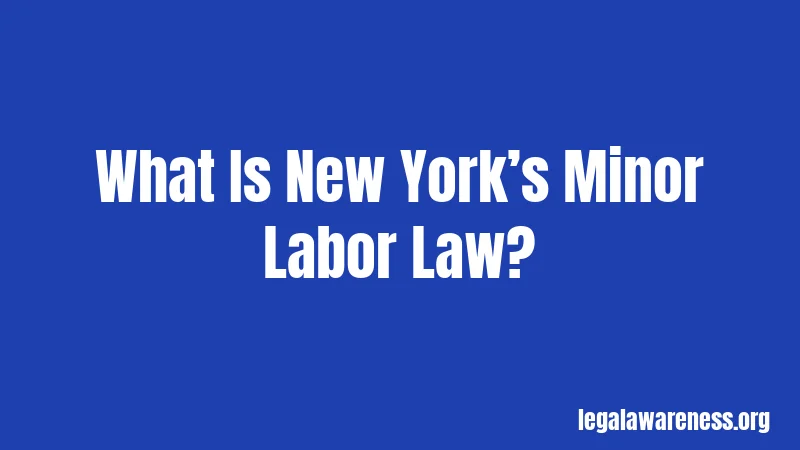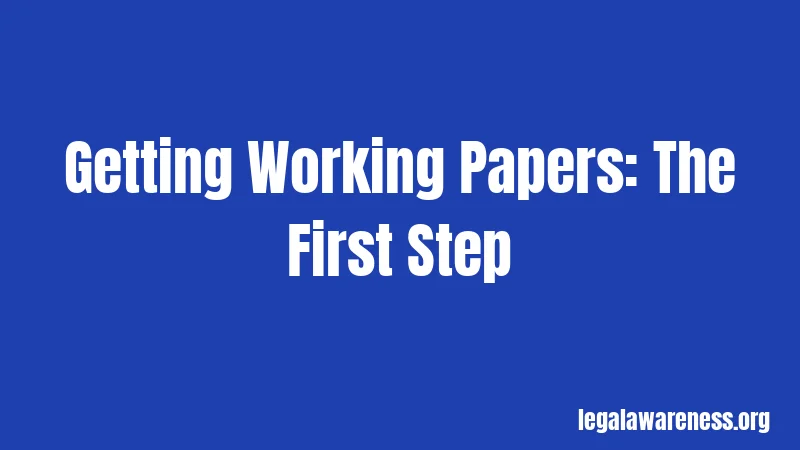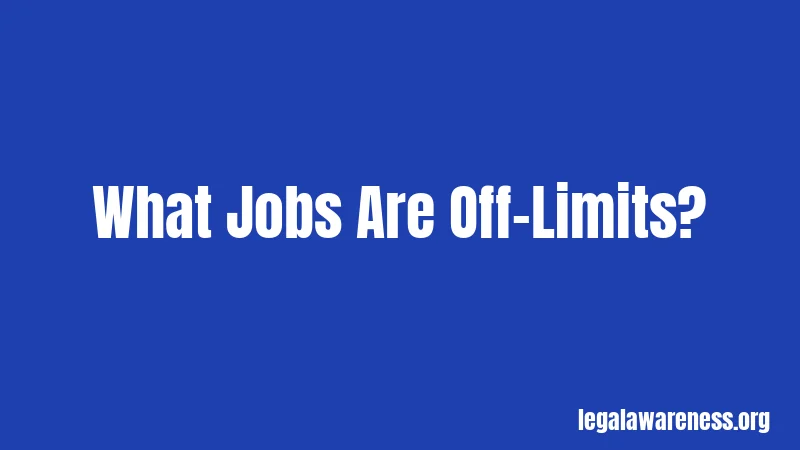New York Labor Laws for Minors (2026): What Just Changed
Most people don’t realize how strict New York’s child labor laws actually are. Seriously. And in May 2025, things got even tougher. Penalties for employers just skyrocketed, and major changes are coming in 2027 that will completely reshape how minors work in the state. If you’re a teen looking for a job or a parent trying to understand the rules, this guide breaks down everything you need to know.
New York has one of the most protective child labor laws in the country. That’s actually a good thing—it means your kids are protected. But it also means employers have to follow some pretty specific rules.
What Is New York’s Minor Labor Law?

Think of it like this: New York’s child labor laws are basically a rulebook for how young people can work. They cover who can work, when they can work, how long they can work, and what jobs are completely off-limits.
These laws exist for one main reason: to protect kids. School comes first. Safety comes first. Period. Working should only happen after those two things are covered. Right? That’s the whole idea behind these rules.
The state considers anyone under 18 a minor. These laws apply to all of them, but the specific rules change depending on age.
Who Can Work in New York?
Here’s the basic breakdown. Kids under 14 basically can’t work. At all. It’s pretty strict, honestly. This is probably the part that surprises most people.
The only exceptions for under-14s are really specific. Your kid can work as a newspaper carrier (age 11 and up), a child performer or model, a farm worker during harvest season, or a bridge caddie at a bridge tournament. Those are basically it. So no, your 13-year-old probably can’t get that summer job at the mall.
Kids who are 14 and 15 can work. But with lots of restrictions. They can do things like work at retail stores, restaurants, grocery stores, or offices. But there are limits on hours, and some jobs are completely off-limits for them.
Teens who are 16 and 17 can work in most jobs. They have more freedom than 14 and 15-year-olds. But even they can’t do certain dangerous or hazardous work.
Getting Working Papers: The First Step

Before your teen can work anywhere in New York, they need something called “working papers.” You might hear people call them employment certificates or work permits. Whatever the name, these are required.
Your teen needs to get these papers from their school. They’ll have to fill out an application, get a doctor’s note showing they’re physically okay to work, and get permission from their parents or guardians. The school will issue the papers, usually in different colors depending on the teen’s age.
Here’s where it gets important. Starting in May 2027, the system is changing. Instead of getting papers from school, teens will apply online through the New York State Department of Labor. Electronic paperwork. It’ll be easier, probably. But we’re talking about 2027, so that’s still a ways off.
Right now? Go to your teen’s school. Talk to the guidance counselor. They’ll walk you through the whole process.
One more thing: even if your teen finishes high school or gets a job working for family, they still need working papers. No exceptions. The employer has to keep these papers on file for as long as the teen works there.
Hour Restrictions: When and How Much Can Minors Work?
This is where New York gets really specific. And honestly, these rules are strict. But they make sense once you think about it.
For 14 and 15-Year-Olds
When school is in session, your 14 or 15-year-old can work a maximum of 3 hours on school days. That’s after school hours, of course. They can’t work during school time (unless they’re in the school cafeteria, which is an exception).
On non-school days or weekends, they can work up to 8 hours. For the whole week when school is happening, the maximum is 18 hours total.
The hours they work matter too. They can’t work before 7 a.m. or after 7 p.m. (That extends to 9 p.m. from June 21 through Labor Day, so basically summer.)
When school is not in session—like summer vacation—the rules relax a bit. They can work up to 40 hours per week. They still can’t work before 7 a.m., but they can work until 9 p.m. during summer.
Not sure what counts as a school day? If your teen’s school is open, it’s a school day. Period.
For 16 and 17-Year-Olds
Teen workers aged 16 or 17 have more freedom. When school is in session, they can work up to 28 hours per week. That’s basically part-time work during the school year.
When school’s not in session, they can work up to 48 hours per week. That’s almost full-time. They can work between 6 a.m. and 10 p.m. on school nights (Sunday through Thursday) without special permission.
Want them to work between 10 p.m. and midnight on a night before a school day? They need written permission from a parent. They also need a certificate from their school showing they’re doing okay academically. “Good grades” basically.
When school’s not in session, 16 and 17-year-olds can’t work between midnight and 6 a.m. That seems fair, right?
What Jobs Are Off-Limits?

Stop right here. This part is important. Some jobs are just not legal for minors in New York. Zero exceptions.
Minors under 16 cannot work in factories. Period. They can’t operate machinery. They can’t work in dry cleaning or shoe repair shops if the work involves dangerous equipment or chemicals. Manufacturing? Nope. Mining? Absolutely not.
Here are the jobs that NO ONE under 18 can do in New York:
Work that involves radiation or radioactive materials. Handling toxic or hazardous substances. Running power-driven machinery (with very limited exceptions). Working in establishments that serve alcohol for on-site consumption. Working in penal or correctional institutions (anything involving prisoners). Operating elevators or hoisting machines. Working with meat slicers or meat processing equipment. Construction work. Working as a helper on a motor vehicle.
There are more, honestly. But you get the idea. Basically, anything dangerous, anything involving heavy machinery, anything involving toxic stuff—those are all illegal for minors.
Even if a job seems simple, if it involves any of this stuff, it’s illegal. Employers who hire minors for these jobs can face serious penalties. And I mean serious.
Minimum Wage and Pay
Good news on this front. Minors get paid the same minimum wage as everyone else in New York.
As of January 2025, minimum wage in New York varies by location. In New York City, Long Island, and Westchester County, the minimum wage is $16.50 per hour. In the rest of the state, it’s $15.50 per hour.
Your teen should get paid at least that much. No exceptions. They’re doing the work. They get paid the same.
The Major Changes: What You Need to Know About 2025 and 2027
Okay, this one’s important. In May 2025, Governor Hochul signed new laws that made penalties way stricter for employers who violate child labor laws. And they’re getting even bigger changes coming in May 2027.
Penalty Changes (Effective May 2025)
Previously, an employer who violated child labor laws might face a $1,000 fine for the first violation. No big deal for a huge company, honestly.
Now? A first violation can result in up to $10,000 in penalties. A second violation jumps to between $2,000 and $25,000. And if an employer keeps violating these laws? Penalties can reach up to $55,000.
If a violation causes serious injury or death to a minor, the penalties are even higher. We’re talking $3,000 to $30,000 for a first violation and up to $175,000 for repeat violations.
This is a game-changer. Employers are paying attention now. They have to.
Coming in May 2027: Electronic Working Papers and a Statewide Database
This is huge. Starting May 9, 2027, the entire system changes.
Right now, schools handle working papers. Your teen applies through their school. The school issues them. The employer keeps them on file.
In 2027, that all moves to the New York State Department of Labor. There will be an online portal where minors can apply for their working papers electronically. No more in-person applications. No more waiting. It’ll be faster, honestly.
The state is also creating a statewide database. This database will track minor employees and their employers. It’s basically the state’s way of saying, “We know who’s working and who’s hiring them.” This makes it way harder for employers to break the rules and get away with it.
There’s also a new requirement coming: employers will have to certify that they’re only allowing minors to work in jobs that are actually legal for them. No more “We didn’t know that job wasn’t allowed” excuses.
One more thing getting eliminated in 2027: the newspaper carrier exemption. Right now, 11-year-olds can be newspaper carriers. Starting in 2027, that’s gone. That loophole closes.
What Happens If Rules Are Broken?
Let’s say an employer hires a 15-year-old and makes them work 50 hours a week during the school year. Or they put a 14-year-old on a meat slicer. Or they schedule a teen to work during school hours when they shouldn’t.
That’s a violation. And the employer will pay for it.
The penalties I mentioned earlier? They’re not just threats. The New York State Department of Labor actively enforces these laws. They investigate. They audit. They fine employers who break the rules.
From a teen’s perspective, here’s what matters: if an employer is asking you to work illegally, that’s a problem. You can report it. Your parent can report it. You’re not in trouble for speaking up.
Special Situations and Exceptions
There are a few special cases worth knowing about.
Babysitting
Minors who are 14 or older can babysit. This is exempt from the normal working hours rules. So if you’re a 14-year-old babysitter staying at someone’s house until midnight on a school night? That’s allowed. Babysitting is its own thing, legally speaking.
Farm Work
Minors can work on farms picking fruits and vegetables during harvest season. There are specific rules about this (minimum age, hours, parental consent), but farm work has its own category of rules.
Cooperative Education Programs
If your teen is enrolled in an approved cooperative education program through their school, some of the normal hour restrictions can be relaxed. These programs coordinate school and work, so the hours work differently. Talk to your school about whether your teen qualifies.
Work-Study Programs
Students in approved work-study or on-the-job training programs might have different hour rules too. The key is that the program has to be officially approved by the school or Department of Labor.
What Should Minors and Parents Do?
Wondering what you actually need to do? Here’s the practical side.
If you’re a teen looking for work, get your working papers first. Before you even apply anywhere. Talk to your school guidance counselor. Get the application. Get the medical exam. Get it done.
Be aware of the rules. Know that you can’t work during school hours unless you have special permission. Know that you shouldn’t be doing dangerous work. If an employer asks you to do something that seems off, it probably is.
Talk to your parents about any job offer. They need to know what hours you’d be working, what the job actually involves, and whether it fits with your schedule and school.
If you’re a parent, stay involved. Know where your teen is working. Know what hours they’re scheduled. Make sure the job isn’t interfering with school. If you think something’s wrong—if the hours seem too long or the work seems too dangerous—talk to your teen’s employer or contact the Department of Labor.
If you’re an employer hiring a teen, get those working papers. Keep them on file. Follow the hour restrictions. Don’t ask them to do hazardous work. Post a schedule showing their work hours. And honestly, get familiar with the rules. With penalties going this high, ignorance isn’t a defense anymore.
Reporting Violations
Confused about whether something’s a violation? Not sure if a job is legal for a teen?
The New York State Department of Labor handles all of this. You can contact them. You can ask questions. You can report violations if you think they’re happening.
The Division of Labor Standards specifically handles child labor issues. They investigate complaints. They do audits. They enforce the law.
If your teen is being asked to work illegally, or if you think an employer is breaking the rules, you can report it. It’s anonymous if you want it to be.
Frequently Asked Questions
Can a 13-year-old work at a retail store?
No. Minors have to be at least 14 to work at retail stores or most other jobs. The only exceptions for younger kids are newspaper carriers (11+), performers and models, and farm workers.
What if my teen’s employer wants them to work during school hours?
That’s illegal. Unless your teen is in a special program like cooperative education, they can’t work during school hours. The school attendance requirement comes first.
Can a 16-year-old work the night shift?
Partially. They can work until midnight with parental permission and good grades. But they can’t work between midnight and 6 a.m. on non-school nights. During school weeks, they can only work until 10 p.m. without special permission.
What if my teen doesn’t have their working papers yet?
They can’t start work until they have them. Period. An employer can’t legally hire them without those papers. Some employers might try to let someone start “before the paperwork is done.” That’s illegal.
Do minors have to follow the same minimum wage rules as adults?
Yes. They get paid the same minimum wage as everyone else in their area. No “teen minimum wage” in New York. If everyone else is making $16.50, your teen should be making $16.50 too.
Final Thoughts
New York takes child labor seriously. Really seriously. These laws exist because young workers need protection. They need time for school. They need to be safe. They don’t need to be working in dangerous jobs or pulling 50-hour weeks while they’re trying to learn algebra.
If you’re a teen thinking about getting a job, that’s great. Work experience is valuable. Just make sure it’s legal and doesn’t mess with school. Get your working papers. Follow the rules. Talk to your parents.
If you’re a parent, stay involved. Know where your teen works. Know what they’re doing. Stay informed about these rules.
If you’re an employer, follow the law. Keep those working papers. Post schedules. Respect the hour limits. With the new penalties, it’s just good business.
Stay informed, stay safe, and when in doubt, reach out to the New York State Department of Labor. They’re there to help.
References
- New York Department of Labor – Employment of Minors
- New York Department of Labor – Hours of Work for Minors
- New York Department of Labor – State Prohibited Occupations for Minors
- New York Labor Law Article 4 – Employment of Minors
- Littler – New York Enacts Sweeping Amendments to Child Labor Laws (May 2025)
- Law and the Workplace – Approved New York State Budget Bolsters Child Labor Protections (May 2025)
